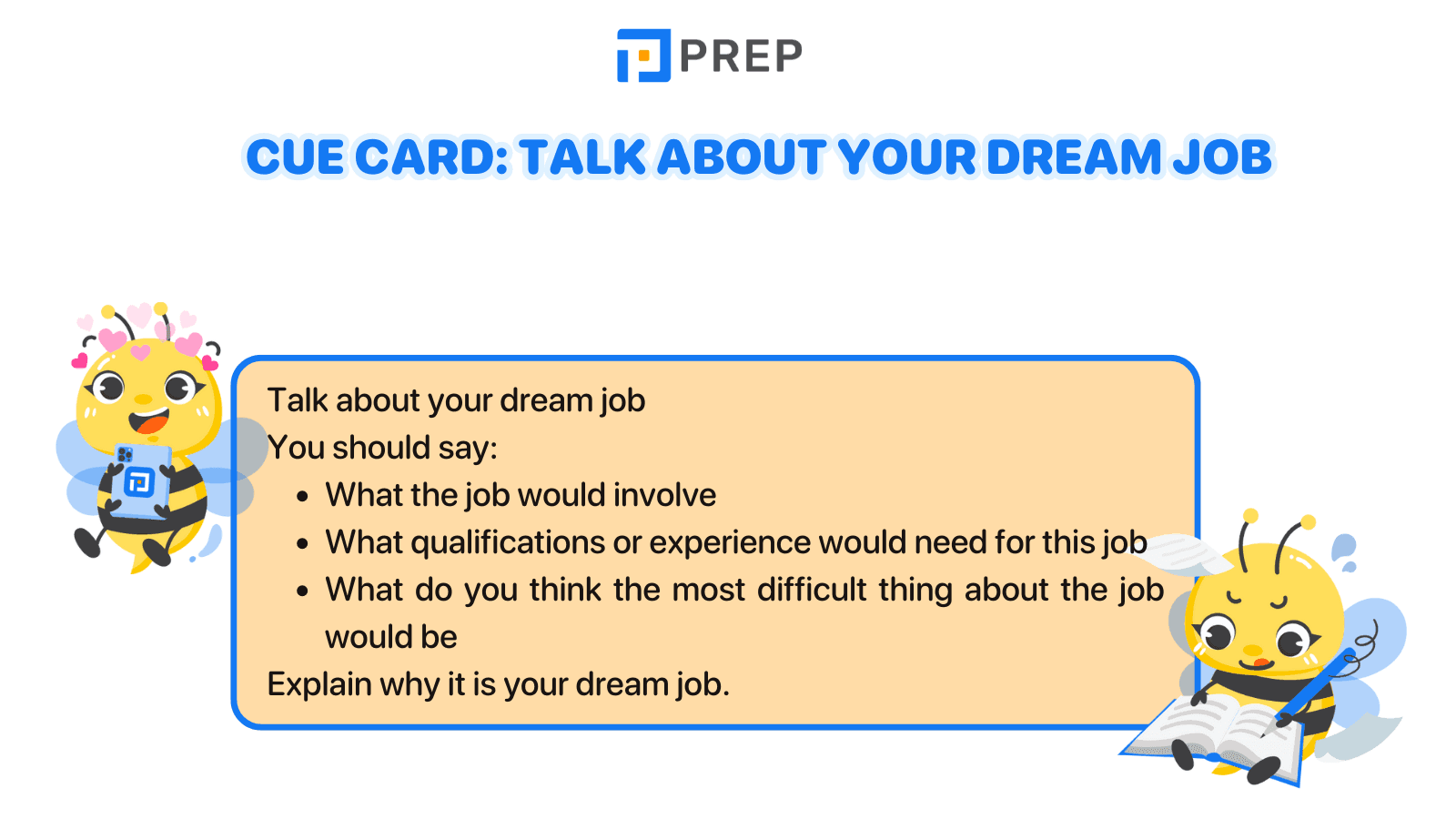Sample IELTS Speaking Part 2, 3: Talk about your dream job
Describing your dream job is a common topic in IELTS Speaking Part 2. This is a relatively easy topic if you have a good grasp of vocabulary related to the Job/Work theme. In addition, to achieve a high band score, it is important to know how to develop ideas and organize them coherently.
In this article, PREP will share with Preppies an outline, ideas, and a detailed sample for IELTS Speaking Part 2 + 3 on the topic "Talk about your dream job." Please refer to the sample below on the topic "Talk about your dream job."

I. Sample IELTS Speaking Part 2, 3: Talk about your dream job

1. Cue card: Talk about your dream job
Talk about your dream job:

2. Part 2 Outline
|
Setting (who, how, when, where) |
Details of the job; Qualifications/ Experience needed |
| Stumbled upon a fashion TV show -> inspired to become a fashion stylist |
|
|
Most difficult thing about the job |
Why dream job + Feelings |
|
|
3. Sample Speaking Part 2: Talk about your dream job
The sample "Talk about your dream job" helps you practice and prepare for the IELTS exam more easily.
As an ambitious girl, I have had a plethora of different professions I want to immerse myself in. The one that holds a special place in my heart is fashion stylist, a job not at all related to my current career.
So how was I inspired to dream of pursuing this job? Everything began when I stumbled upon a well-known foreign reality TV show called “Say yes to the dress”, in which brides-to-be come to a wedding boutique to search for their dream wedding gowns. Watching Gok, the main stylist of the show, have the time of his life dressing up his clients has left a long-lasting impression on me.
This profession comes with a variety of tasks. Fashion stylists are often in charge of creating appropriate visual aesthetics for their clients - whether these clients are celebrities or just ordinary people wanting to look presentable and outstanding for a special occasion. In order to do this, they would incorporate different clothing items and accessories, some even go so far as to provide advice on the way in which makeup and hairstyling should go to create the perfect look.
Well-trained fashion stylists can become directors for massive fashion shows and runways, or hired to prepare scripts for photoshoots. They must have a vast knowledge of fashion and fabric constructions, as well as a profound understanding of human’s body and face shapes. As for personal qualities, they should have an eye for art and are detail-oriented.
While this profession is incredibly fascinating, it is demanding with lots of unanticipated job hazards. First, keeping up with the latest fashion trends as micro-trends are becoming the norm in the industry can be quite taxing. Also, as body types, facial features, complexions and fashion senses vary from one person to the other, it can be a challenge to style each individual. Should you commit to a styling job, working within budget is also an obstacle in certain cases.
Despite everything, being a fashion stylist is still a dream of mine. I have always had a genuine passion for fashion, and I believe that every person deserves to become the best version of themselves through means of appropriate clothing choices. Clothes may not be everything, but they are strong self-expression tools and can explicitly define one’s personality and values. That’s why it would be an absolute dream come true to be a part of this wondrous profession.
Having a strong vocabulary is crucial for performing well in IELTS Speaking Part 3. In this section, you are expected to engage in more complex discussions and express your opinions on various topics. A rich vocabulary allows you to articulate your thoughts effectively, convey precise meanings, and demonstrate a higher level of language proficiency. It enables you to accurately comprehend and respond to questions, express nuanced ideas, and provide detailed explanations. Moreover, a wide range of vocabulary helps you adapt your language style to different contexts and appropriately convey your intended message. Overall, a strong vocabulary enhances your fluency, coherence, and lexical resource, playing a significant role in achieving a higher score in IELTS Speaking Part 3.
Highlighted Vocabulary in the sample "Talk about your dream job":
- a plethora of: a large number of, often more than necessary
- immerse oneself in: deeply involve oneself in, fully become a part of a certain job
- stumble upon: accidentally come across, encounter
- boutique: a fashion store
- wedding gowns: wedding dresses
- have the time of his life: have an extremely enjoyable and exciting experience
- visual aesthetics: visual art, visual impressions (in this context, it can be understood as style)
- presentable: well-groomed, neat
- outstanding: remarkable, exceptional
- incorporate: combine, integrate
- fabric constructions: textile structures
- a profound understanding of: extensive knowledge and understanding of a particular field
- have an eye for art: have a good sense of art
- detail-oriented: paying attention to details
- unanticipated job hazards: unforeseen job risks
- micro-trends: short-term fashion trends
- become the norm: become common, widespread
- taxing: demanding, tiring
- facial features: facial characteristics
- complexions: skin tones
- working within budget: completing tasks within a specified budget
- self-expression tools: tools for expressing oneself
- define one's personality and values: shape one's personality and values
- wondrous: marvelous, extraordinary
For more information, refer to the article:
- Sample Speaking Part 2: Describe an event that changed your life
- Sample Speaking Part 2, 3: Describe a law on environmental protection
- Sample Speaking Part 2, 3: Describe a person you follow on social media
II. Sample Answer for IELTS Speaking Part 3 - Talk about your dream job

1. What are the most difficult jobs that people do?
I think it really depends. Each person has his or her own strengths and weaknesses so it’s very difficult to just name a few “challenging” careers. Personally, I believe that every profession is demanding in its own way, and we should not subjectively generalize that some are more difficult than others. Not to mention that we all have different work ethics and performance standards.
For example, considering the same job tasks at the same level in the same organization, some staff might find them manageable, whereas many others may be stressed out.
- Subjectively: in a subjective manner
- Generalize: to make general statements or conclusions
- Work ethics: the principles and values that guide one's behavior and attitude towards work
- Performance standards: the criteria or expectations for evaluating the quality or effectiveness of work
- Stressed out: feeling overwhelmed or under pressure, experiencing high levels of stress
2. Why do you think some people choose to do difficult jobs?
As an adventurous person myself, I can partly understand why some people would decide to pursue a more challenging career path. Sometimes a difficult and unpredictable job would give some of us the satisfaction we need in our career. Passion is also a determining factor when we choose our future profession. Yes, it might be more challenging, but as long as we’re motivated and living with a sense of purpose, I think that would make our lives much more fulfilling.
- adventurous: enjoying or seeking adventure
- pursue a career path: to actively follow or choose a specific career trajectory
- determining factor: a factor or element that influences or decides something
- a sense of purpose: a feeling of having a clear aim or goal in life
- fulfilling: satisfying, bringing a sense of accomplishment or contentment
3. Do you agree or disagree that all jobs are difficult sometimes?
No doubt. Some jobs might be more physically demanding than the others, such as athletes and nurses, but it’s undoubtedly that at some points any job can become mentally exhausting, no matter how easy it seems.
Rather than saying it is completely because of the work’s nature, I’d say that it’s a part of our lives that we have to deal with tons of things, ranging from professional to personal issues. Sometimes, when we lose our work-life balance, our performance at work and even motivation to work can easily deteriorate. So yes, every profession is straining at times.
- physically demanding: requiring a lot of physical effort or strength
- work's nature: the inherent characteristics or qualities of a job
- tons of: a large amount of, a great quantity of
- work-life balance: the equilibrium between one's personal life and professional/work life
- deteriorate: to decline or worsen in quality or condition
- straining: putting excessive pressure or stress on something or someone
4. Is it always necessary to work hard in order to achieve career success?
It’s not necessarily the case for everyone. Some people have the innate talent needed to fly high in their careers. But for the majority of us, hard work is more or less the key to success. And that also doesn’t mean to invalidate born-gifted people’s hard work. I think the effort they put into their jobs might not be what we expect from ourselves, but objectively speaking, so long as we’re working towards our personal goals, every success, small or big, is the result of hard work.
- Not necessarily the case for everyone: Not true for everyone
- innate talent: natural talent
- fly high: achieve great success in one's career
- more or less: to some extent, more or less
- invalidate: deny or negate
- born-gifted: naturally talented individual
- objectively speaking: speaking in a neutral and unbiased manner
- working towards: making efforts or striving towards something
III. Achieve Band 7+ and Beyond
This article has provided the most detailed sample for IELTS Speaking Part 2 + 3 on the topic "Talk about your dream job." You should refer to the sample article and avoid copying it entirely. Don’t let IELTS stand between you and your future. With comprehensive training in Writing, Speaking, Listening, and Reading, we ensure you’re fully prepared to succeed.
👉 IELTS online course : Join Now and Get Ready to Ace Your Exam

Hi I'm Chloe, and I am currently serving as an Product Content Administrator at Prep Education. With over five years of experience in independent online IELTS study and exam preparation, I am confident in my ability to support learners in achieving their highest possible scores.
Comment
Premium content
View allPersonalized roadmap
Most read












